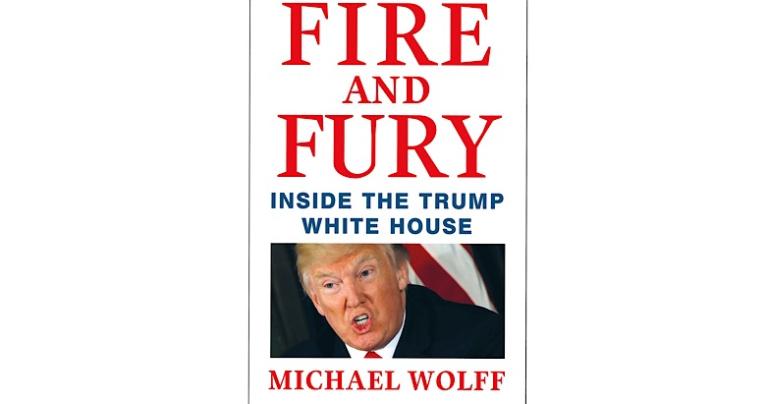
This is a review of a book, not of the President of the United States.
The book is The Fire and the Fury by Michael Wolff (electronic copy: Henry Holt and Company, 2018). I have no way of knowing whether all the details in it are true, though when Slate calls it “shoddy journalism” one does not have much hope. Slate is not friendly to this administration and has no reason to dislike a book that attacks Mr. Trump.
Whenever one can check the facts, one finds that Michael Wolff is to historical criticism of the President as David Barton is to the study of Thomas Jefferson: useless, wrong, and counter-productive.
The book as a money making scheme obviously has been a great success for the author. As a critic once pointed out to me, my own books sales would not quite pay for a latte in Washington, so I am not one to criticize on this front. Writing on Plato, apologetics, or Great Books is not generally a pathway to fortune. I am content, but Mr. Wolff seems to have other goals in mind than philosophical enrichment.
He has his reward.
If we assume that at least one additional purpose of the book is to attack the President, then it should be viewed as a great failure. By the end of the book, a reasonable reader might sympathize with the President even if he has never done so before.
This review is not, however, about the President, but about why this book fails to land any blows on Mr. Trump.
Did Michael Wolff Go Too Far?
If you are engaged in persuasion, take note that overstating a case is worse than understating. Calling Mr. Trump a senile idiot is less effective with the unpersuaded than carefully listing his errors or failings.
Perhaps Mr. Wolff has made the mistake of overestimating how unpopular Mr. Trump is. Roughly 40% of Americans approve of the job he is doing (whether I like it or not) and just over half disapprove.
There is no reason to think the President could not be re-elected given those numbers, though I assume he would not be the favorite against a centrist candidate.
Will books like Michael Wolff’s encourage the opposition to run such a centrist? Or will they assume, as they did with Mrs. Clinton, that anyone can beat this lunatic?
Michael Wolff may have simply been engaged in selling books to those who resist the President. After all, telling a group what they wish to hear can be good business. Ask Dinesh D’Souza.
To the credit of those in the Resistance, many opposed to Trump have not trumpeted the book. The President has chosen to attract attention to it by attacking it. The President is playing a clever game. He makes money for Mr. Wolff, but also makes Mr. Wolff’s (evidently) flawed book the chief criticism against him. Since his partisans will find it easy to find factual errors in the book, the President will be able to shift attention from better books or cases.
Everybody wins: Michael Wolff makes money and the President gets a weak critic. This is how media works and the President and Mr. Wolff know the rules. They are (in this sense) pretend foes.
Fire and Fury Doesn’t Prove its Case.
Yet the problems go beyond what I cannot know to the foolishness of the rhetoric Wolff uses. The book is written badly as rhetoric against the President for anyone who does not hate, despise, or loathe Mr. Trump at a gut level.
It may be true that everyone who works for Mr. Trump thinks he is a fool, dolt, or idiot, but this is very unlikely. Mr. Trump has attracted millions of loyal voters and not all of them are irrational. Does everyone now in the White House stay only to keep things from flying apart? Are things flying apart?
Maybe, but great care, footnoting, and strong sources would be necessary to prove this is the case. Instead, we get assertions that the players deny. Since Wolff is fabulist and the White House has a history of lies, nobody knows. I do not. However, surely somebody in the White House likes or supports the President.
History teaches that the worst sort of despot or idiot in power still attracts the Protopovov, or naive loyalist. Has any tyrant or foolish ruler (assuming the President is one or the other) died mourned by nobody?
Maybe, but I am hard pressed to name one. I might have no problem believing that our present Secretary of State is there only to do his duty to the country, but find it hard to believe all the political appointees are in the same boat.
Is no man loyal to the President?
I have a boundless belief in cupidity and cynicism in politics, but I also know enough to be skeptical.
First, if Wolff wanted to make his case, he might have been more circumspect. He might have found one person who likes the President and described him. If Mr. Trump truly has not one true believer, Mr. Wolff should have carefully documented this remarkable finding.
Second, Mr. Wolff is not content to make Trump out to be merely ignorant, narcissistic, or foolish. That might be plausible. We can read transcripts of interviews. Instead, he goes further and presents Mr. Trump as so nearly senile, or so much in the grip of erotic impulses, that it is hard to see how the President ever gets anything done. Since we can see Mr. Trump on television daily, this is grossly overdrawn and will soon be subject (I suspect) to medical refutation.*
Mr. Trump can read a speech well if he chooses to do so. He has an astounding ability to capture the weakness of his opponents (Low Energy Jeb, Little Marco, Crooked Hillary, Sloppy Steve Bannon). This is not Lincolnesque, but it is quite effective in its way. While it may show brutality and crudity, it is not the work of senility. I know people who have done business deals in the recent past with Mr. Trump and while he is no intellectual, he knows his trade and how to build a brand.
Finally, Wolff asserts that while Mr. Trump craves being liked (especially by the media), he has no desire to be liked by any particular establishment. Mr. Trump is portrayed as a blank slate, but this often allows him to resist dubious ideas in the areas of economics and foreign policy. That Trump does not care about the opinions of those who have failed us in places like Afghanistan is, if anything, endearing.
Is it Better to Be Lucky Than Good?
Given the relative health of the economy, the end of ISIS, and the absence of new shooting wars, Mr. Wolff has set Trump up for the ultimate political calculus on the part of many voters. If Wolff is right, Trump is no good—an opinion that many of us share. If Wolff is right (and he almost surely has overstated his case), then Trump is the luckiest man now living.
Apologetics and anti-religious writings have both been infected with the kind of material Michael Wolff has written: unpersuasive to anybody not in the camp, but exactly what the camp wishes to hear. Such books sell but at the cost of debasing our discussions and further eroding our Republic.
———————-
*Lo it is.
Rachel Motte edited this essay.











